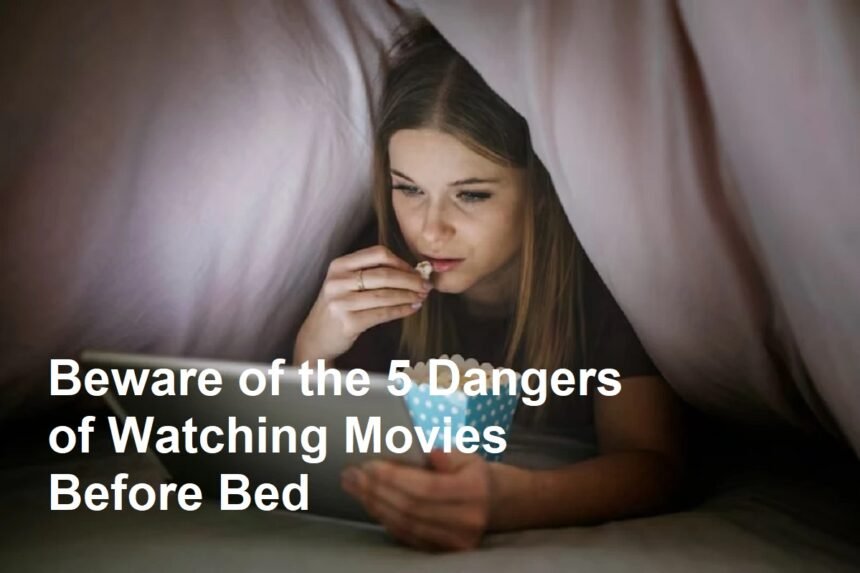Introduction
Many people love ending their day with a good movie in bed—it feels relaxing, fun, and like the perfect way to unwind. But here’s the thing: what seems harmless can actually be harmful to your sleep quality and overall health. In this article, we’ll explore why people watch movies before bed and uncover the 5 major dangers of watching movies before bed for your health. Plus, we’ll share tips to help you break the habit and improve your sleep.
Why Do People Watch Movies Before Bed?
It’s easy to see why this habit is so common. After a long day, lying in bed with a cozy blanket and an engaging film can feel like the ultimate comfort. Some common reasons include:
1. Stress Relief
Movies provide a quick escape from daily worries, helping you temporarily forget work stress or personal problems.
2. Entertainment Convenience
With streaming services available on your phone, tablet, or smart TV, watching a movie in bed is more accessible than ever.
3. Bedtime Routine Habit
For some, watching something before sleeping has become a nightly ritual that signals the end of the day.
The 5 Dangers of Watching Movies Before Bed
While the habit may seem harmless, research shows it can cause more harm than good. Let’s break down the risks.
1. Blue Light Disruption
Electronic devices emit blue light, which tricks your brain into thinking it’s still daytime. This can suppress melatonin, the hormone that helps you sleep, making it harder to fall asleep and stay asleep.
Tip: If you must use a screen, enable night mode or blue light filters—but ideally, avoid screens at least 30–60 minutes before bed.
2. Overstimulation of the Brain
A suspenseful or action-packed movie can raise your heart rate and keep your mind active, making it difficult to relax. This is especially true for thrillers or horror films, which can leave your mind racing.
Tip: Swap intense movies for calming activities like reading a book or listening to soft music.
3. Poor Sleep Quality
Even if you manage to fall asleep after a movie, your sleep may be lighter and more restless. Studies show that late-night screen time can reduce deep sleep stages, leaving you feeling tired in the morning.
Tip: Create a “wind-down” routine that helps signal your body it’s time to rest.
4. Risk of Eye Strain
Watching movies in a dark room for long periods can strain your eyes, leading to dryness, irritation, and headaches.
Tip: Keep a dim light on in the room and take short breaks to rest your eyes.
5. Mental Health Impact
Constant late-night movie watching can affect your mood, leading to irritability, reduced focus, and even increased anxiety—especially if you’re consistently sleep-deprived.
Tip: Prioritize 7–8 hours of sleep each night to protect your mental and emotional health.
How Watching Movies Before Bed Affects Health
The dangers of watching movies before bed for health go beyond just feeling tired the next day. Lack of proper rest can:
- Weaken your immune system
- Increase the risk of chronic conditions like heart disease or obesity
- Affect hormone balance
- Reduce productivity and focus
By understanding these risks, you can make better choices for your evening routine.
Healthier Alternatives to Nighttime Movies
If watching something helps you relax, there are healthier ways to do it without sacrificing sleep quality:
1. Watch Earlier in the Evening
Try to finish your movie at least 1–2 hours before bedtime to give your brain time to wind down.
2. Choose Calming Content
Opt for light comedies or documentaries instead of intense, fast-paced films.
3. Replace Screen Time with Relaxing Rituals
Consider meditation, gentle yoga, or journaling before bed.
Final Thoughts
While watching a movie before bed can feel like a harmless way to relax, it’s important to understand the potential downsides. The 5 dangers of watching movies before bed—from blue light exposure to poor sleep quality—are worth considering if you care about your health.
Now that you know the risks, it’s time to rethink your bedtime habits. Which of these dangers surprised you the most? Share your thoughts in the comments and let’s start a conversation about how to create healthier nighttime routines.












